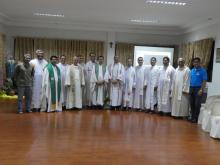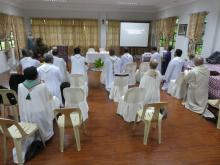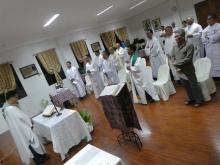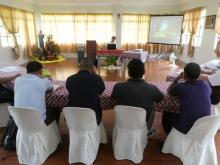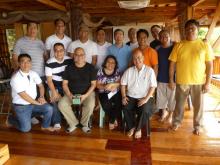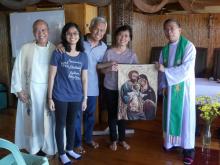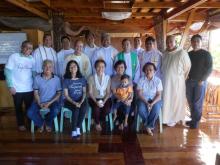ORAMUS ET SERVIMUS
We Pray, Serve and Celebrate the Promises of Midlife Years
MIDLIFE TRANSITION ENCOUNTER
The JOVIALS’ and The GOLD DIGGERS’ Aggiornamento
Lily’s Garden
Bo-ol District, Tagbilaran City, November 11-20, 2017
November 11, 2017, Saturday
During the celebration of the Holy Eucharist, presided over by Fr. Ariel Tecson, the Provincial Councilor for the Sector on the Religious Life, Formation and Pastoral Care for Vocations and is in-charge of the Ongoing Formation Programs for the different age-groups of the religious and priests of the St. Matthew Province, the Midlife Transition Encounter of the Rogationists in their 16th and beyond years in their priesthood and/or religious life was officially opened. [*This group of 28 priests and 3 religious brothers are divided into two smaller groups: one who call themselves the JOVIALS (15 members); and the other, who refers to themselves as the Gold Diggers (16 members)] 14 participated in this 20-day event. In this liturgy, Fr. Tecson handed on a personal letter to welcome each participant, inviting him, with the rest, to be open and docile to the Spirit, wishing them the best that the fraternal sharing and communion be a meaningful one.
Bro. Christian led the prayers of the day.
November 12, 2017, Sunday
Mercedarian Retreat House
The entire day was spent in Spiritual Recollection at the Mercedarian Retreat House, in Cogon District, Tagbilaran City, with Fr. Dexter Prudenciano as faciltiators. In the morning, Fr. Prudenciano spoke on “RCJ: Dig and Harvest Joyfully (Some insights from the XII General Chapter”, and in the afternoon, he presented “RCJ for Life: Harvesting joyfully with our life skills”. Towards the end, each participant was given the chance to share about how their expectations were met (or not), giving as well some suggestions to live out concretely the lessons learned from their inputs.
The spiritual exercises were highlighted by the Eucharistic Adoration, led by Fr. Nicolas Villora, and the Holy Mass, presided over by Fr. Prudenciano.
The group tried a newly opened seafood “boodle fight” restaurant for dinner.
Bro. Nilo Pelobello, who just arrived from Italy the previous day, joined the group this day, and so did Fr. Antonio Dammay, who came from Pangasinan.
Bro. Ed led the prayers of the day.
November 13, 2017
Right after the Morning Prayers, Fr. Mariano Antonio Ranera, Jr. presided over the Holy Mass, which opened the day’s sessions.
Fr. Herman Abcede, the Provincial Superior, took the opportunity in the morning to talk to the participants of the Encounter. He commenced by showing them the video presentation prepared by Fr. Rito Ybañez about the St. Matthew Province, which was also presented during the recently concluded Conference of the Superiors of the Circumscriptions and their Councils in Rome, Italy. The group shared some suggestions to improve it. Among the suggestions were: the inclusion of the St. John Paul II Parish and the Missionaries of the Rogate, checking of the grammar in the narration and subtitles, the use of updated pictures and videos (Fr. Rito Ybanez was tasked to go around the communities to take pictures and videos), consistency in the size of the pictures and the text, choose another background music, check on the speed of narration and the transitions of pictures, check on the color of the entire video, use videos of interviews (this will be part of another video), seek professional help to ensure that the presentation is timely and using new techniques.
He, then, solicited for proposals for the future affairs of the St. Matthew Province.
· Consider the Year of the Clergy and the Consecrated Persons.
· Organize a Pilgrimage and consider those in most need of participation (those celebrating significant dates: Anniversary of Religious Profession and Priestly Ordination).
· Organize a Congress of the Rogate Family.
· A suggestion to recall the 40th Death Anniversary of Fr. Diego Buscio, when Fr. Vito Di Marzio shall be invited. It was suggested that Bataan be visited again as a Province to reflect and recall the history.
· It was suggested that there be a Prayer for Priests be distributed in all Schools.
· The organization of Anniversaries are done as if personalized depending on each owns capacity, let there be a program applicable for all.
All these will be evaluated to see their feasibility.
He also spoke of the manuals and guidelines (or implementing rules and regulation) to be soon implemented ad experimentum: Scholarship, Child Protection, Association of Rogationist Catholic Educational Communities of the Philippines, Pastoral Plan of the Rogationist Parishes; Administration and Economy (Employees’ Manual for the Enterprises/Communities), Union of Prayer of Vocations, etc. All these, he hopes to approve during the Second Provincial Chapter. The status and duration of documents being “ad experimentum” was discussed briefly.
He said that the 2nd Provincial Chapter shall be held on October 15-20, 2017 and just awaiting final approval from the General Superior. Technologies [for votations] needed for the event shall be borrowed. It was suggested that it starts on the Morning of Monday and end it by morning of Saturday. Suggestions about this event shall be considered by the Ad Hoc Committee In-Charge of Preparation of the Provincial Chapter. Fr. Ariel asked what sort of preparation is organized in preparation for the upcoming election. It was proposed that that the Ad Hoc Committee not include any Provincial Councilor. It shall be decided soon, whether or not there will still be a Pre-Capitular Document.
He spoke of the idea of creating a program on Vocation Ministry [to be offered in a School of Theology] which may be given to prepare students in before, and even in preparation for their specialization.
He also explained the requests for personnel from other Circumscriptions.
He spoke of the offer to take on a rural Parish Church in Cebu.
He, then, reported on the Religious House Construction Project in Binh Duong, Vietnam and on the Seminary Construction Project in Ribang, Maumere, Indonesia. He mentioned of the St. Matthew Province’s contribution “una tantum” to the General Curia, from which the General Superior took some funds to help complete the said Project in Indonesia.
Papua New Guinea is now active in its missionary activities, with the help of the confreres there, he reported. The two brothers are ending their practical training and he intends to send Vietnamese and Indonesia religious to replace them. Fr. Giulio also expressed his desire to update and train himself in skills needed in the mission.
Fr. John Youn is now the new Responsible of the Missionary Station in Seoul, South Korea. Rev. Jonrey Lauron is set to join the community, but at the moment is still helping the IP Community in Bataan while learning the Korean language. He also spoke of Fr. Nicolo Rizolo’s attempt to enter Gwangzhou, South Korea to start a presence (by working on the Diocese’s Social Arm, especially for the children), with a permission from the General Curia, but will soon be under the St. Matthew Province.
He also explained the 10% contribution of the Communities (from its ministries) for the operations of the Province. He even mentioned the 3% percent allotment for the poor. All these are already included in the new Accounting System which is now used ad experimentum until its final version is completed, with the help of confreres presenting corrections for its improvement.
He talked about Fr. Gabriel Archimedes Flores, whose application for dispensation was recently granted. He also spoke of the situation of Fr. Miguel De Silva, Jr., Fr. Mariano Rondael, Jr., Rev. Espiredion Verano, Jr., Rev. Mark Robin Destura, Fr. Eduardo Fernandez and Fr. Julito Peque.
He also gave the participants an update about the medical conditions of Fr. Cesare Bettoni, Fr. Enrique Raveza III, and Fr. Niptale Frogosa.
He also spoke of Fr. Charleston Tumulak, in response to some queries.
The group discussed briefly the academic status of some deacons, who have not completed their theological synthesis yet.
He, then, mentioned the move to turn over the Office of the Rector of the Rogationist College-Parañaque from Fr. Raveza to Fr. Viktor Emmanuel Aurellana, who now tries everything he can to rationalize all aspects of the School’s operations. Fr. Aurellana turned over his task as Prefect of Studies of the Rogationist Seminary College-Parañaque to Fr. Francisco Gringo Tagabi to lessen his burden and to concentrate on the RC-P management. They also briefly discussed the financial situation of the said School.
The situation of the School in Bolinao, Pangasinan, which is now under evaluation, was also discussed. According to Fr. Antonio Dammay, he opts to close it, because he cannot follow through its operations. Fr. Ranera suggests that it be discussed with the Bishop, and propose to him the possibility of the Diocese to take on the management of its operations. Fr. Herman also gave updates about the Rogationist College-Davao. St. Anthony’s Boys Village-Cavite still supports the Fr. Di Francia Center of Studies. The voucher system was also discussed.
Afternoon Session
Fr. Ariel Tecson introduced the facilitators who are founding members of the GAMOT (Growth Alternative for Managing Ongoing Transformation) Program, which assists the clergy, the religious and even the laity in their Human, Spiritual and Psychological Formation and Renewal: Msgr. Ramon “Nonoy” Masculino, Jr. and Mrs. Cynthia “Cynch” Baga.
Mrs. Cynthia Baga opened the sessions, by speaking of the changes and transitions which ushers stages of life. She led the participants to GROUNDING: to think about “Who I Am?”, “How I Am?”, “Where I am?”, making them realize their present circumstances and their reactions and responses to these realities.
The group was, then, divided into smaller groups (PADRES – Priests and Brothers As Dreamers, Risk-takers, Elders and Sages), for a “Kumustahan Session”, just to know more about each one’s current experiences. Right after, Fr. John Joffer Lucas, Fr. Mariano Antonio Ranera, Jr. and Fr. Antonio Dammay reported on their respective groups’ discussion. Finally, individually they share how they felt as they went through the entire process.
Bro. Nilo facilitated the prayers of the day.
November 14, 2017
Following the recitation of the Morning Prayers, the day commenced with the celebration of the Holy Mass, presided over by Fr. Antonio Dammay and whose homily was delivered by Fr. Joseph Arcaño.
Morning Session
To begin the day’s sessions, Mrs. Cynch facilitated a brief recap of what transpired the previous day, by sharing the personal blessings/graces each received so far.
Then, Msgr. Nonoy, after leading the group in prayer, spoke of “Change and Transition: Challenges of Living a Religious Life in Midlife Years”. He did this by sharing his own tough and challenging experiences of years living his priesthood – a balance of blessings and curses, satisfactions and resentments, denials and acceptance, brokenness and healing, depending whether he handles life with fear or hope. Realizations from such a life include not having regrets, having survived and having celebrated the Promise.
Speaking of St. Paul’s experience in comparison to priests’ life, Msgr. Nonoy read through and explained Acts of the Apostles (20:17-35).
He even quoted Anne Morrow Lindberg saying, “There is no sin punished more implacably by nature than the sin of resistance to change”, to explain better his point.
He added some paradoxes to prove his thought, saying that, “To achieve continuity, we have to be willing to change”.
“The very things we now wish that we could hold onto and keep from change were themselves originally produced by change”.
“We are not on earth as museum keepers, but to cultivate a flourishing garden of life and to prepare a glorious future”, he said further, referring to a quotation attributed to Pope John XXIII.
Change, he emphasized is situational, like having a new Superior, new assignment, etc.
By transition, he said he was referring to a process of letting go – it is the way we come to terms with change. Without transition, a change can be mechanical, superficial and empty. When transition does not occur, or if it has begun but aborted, the result can be devastating.
He said that there are two dimensions in change: the administrative dimension and the formational dimension, which is a spiritual moment, integrative moment and formative and transformative moment.
Transition moments, he emphasized, include departing with deliberateness (take time to say goodbye, letting go of past hurts or to try to heal them, vocalizing gratitude or saying thank you and ritualizing the departure), moving graciously (moving in peace and calm, re-affirming one’s commitment, re-dedicating oneself in priestly ministry) and beginning anew (using one’s past experience, cultivating wisdom and prudence, re-investing in a new situation, listening to God’s new call)… these are the tasks and challenges of Midlife.
Quoting Pope John XXIII again, he said, “Consult not you fears but your hopes and your dreams. Think not about your frustrations, but about your unfulfilled potentials. Concern yourself not with what you tried and failed in, but with what is still possible for you to do”.
He then, spoke of spiritual possibilities: temptations (to disillusionment, to struggle, to crisis), graces (of new beginnings and growth, of vulnerability, of community) and discernment (shifting through the religious life and experiences, determine what is of God and what is not, humble and alert noticing).
He also enumerated some possible responses: sharing of experiences (contextualize one’s experience, draw strength and support, could be comforting and challenging, presence of brothers who care about someone in transition), apt solitude (an essential ingredient in the formative process, moments of noticing, allowing oneself to be carried by the love of God and faith of the people in the community, coming into terms with one’s stable center), appropriate breaks (extended period of study, prayer, and rest between assignments, retreats and recollection, vacation and staycation, nature walks, gardening, etc.), and follow-up (designate a brother or group of brothers, mentor, spiritual director and counselor, ongoing formation, attend some training and updating).
Change comes, but transition must also come with it, he ended.
To conclude the morning session, Mrs. Cynch facilitated the question and answer portion with the participants.
Afternoon Session
After leading the group to prayer, Msgr. Nonoy opened the session he aptly entitled “The Path of Integration” (Embracing Transition).
Using a Chinese proverb, he reminded everyone that, “the beginning of wisdom is to call things by their right names”.
“Three things are necessary for the salvation of man: to know what he ought to believe, to know what he ought to desire and to know what he ought to do”, he explained.
Transition is change.
Underneath change, he said is, transition.
He, then, differentiated changed from transition, saying that change is external, situational and driven to reach a goal, while transition is internal, psychological and begin with “letting go”.
Transition is in the future.
According to William Bridges, and he quotes, “transformation is the true destination of transition. How transition does this is a mystery”.
Transition has three phases: its starts with ending, then, proceeds to the neutral zone and the new beginning manifests itself.
The story of the great flood and the experience of the Israelites leaving Egypt, is a scriptural image of a transition. Even the event of the baptism of Jesus, the entombment, ascension and Pentecost are events of transition.
He enumerated six functions of transition: re-orientation, personal growth, authentication, creativity, spirituality and renewal.
Transition, he explained has losses and endings. He added that there are four dimensions of loss: disengagement, disidentification, disenchantment and disorientation.
As one goes through the three phases of transition, he said, he is faced with an assortment of emotion that includes, (ending) denial, shock, anger, frustration, stress, ambivalence, (neutral zone) skepticism, acceptance, impatience, hope and enthusiasm (new beginning).
For those who leave everything in God’s Hand eventually see God’s hand in everything (Stability Zone: people, community, places, things and ideas).
He, then, asked (from Leonie Sugarman):
· What are your stability zones and how well do they serve you?
· Do you invest enough in your stability zones?
· Are there changes you want to make in your stability zones, and how you use and maintain them?
He left them with some points to ponder:
· What is it that your life is calling upon you to deal with at this moment?
· What chapter of your life is now over?
· What it is, that it’s time for you to let go of?
· How are you experiencing the in-between time?
· How are you coping with it?
· How are you drawing on the religious tradition to help you interpret your experience?
He concluded with some quotations.
Now I become myself (May Sarton)
“Now I become myself. It’s taken time, many years and places; I have been dissolved and shaken. Worn other people’s face…” (Parker Palmer)
“A man who works with his hands is a laborer; A man who works with his hand and his mind is a craftsman, but a man who works with his hands and his brains and his heart is an artist”. – St. Thomas Aquinas
‘Sorrow can be alleviated by good sleep, a bath and a glass of wine.” – St. Thomas Aquinas
Then, he wished them blessings.
Once more, Mrs. Cynch facilitated the question and answer portion with the participants.
The evening was spent watching the 1993 movie “My Life”, which starred Michael Keaton and Nicole Kidman - a movie which displayed much of themes discussed throughout the day.
Bro. Ed led the prayers of the day.
November 15, 2017
After the Morning Prayers, the group with Mr. Rolly and Dra. Edna Sasing-Lao welcomed Most Rev. Alberto Uy, DD, the Bishop of Tagbilaran and Fr. Manuel Mendez, the Parish Priest of St. Vincent Ferrer Parish in Bo-ol District, who joined them from breakfast.
Morning Session
Mrs. Cynch opened the day’s encounters with a prayer aided by a video presentation. Then, for recapitulation, she asked for a word which expresses how each feel as they face the new day. They also discussed briefly how the previous night’s film made them feel. Then, she gave a short review of the movie, focusing on how it was closely related to what the participants are actually learning from the current encounter – particularly about LETTING GO.
The participants were, then, invited to prepare their own “My Life” autobiography, with a help of a map, which includes the following navigating signs: our true self (created in the image and likeness of God - GOOD)… life experiences (human limitations)… needs (affection, assertion, attention, affirmation, appreciation, recognition, understanding, affiliation, etc.)… (1) met… satisfaction (joy and peace)… (2) unmet… frustration… pain/disease… overload… trauma… split… [(1) defense mechanism… (2)coping strategy]… memory/mind (reactive behavior patterns to new behavior pattern)… body/feelings (chromatic tensions and somatic symptoms)… symbolic resolution toward avoidance/withdrawal, away, aggression, against… seeking satisfaction… breakthroughs.
Looking back into their lives, the participants were asked to entitle five significant chapters of their “My Life” autobiographies, to identify the shifts and the coping strategies they used, and to see the invitation for transition.
Afternoon Session
Mrs. Cynch opened the session by soliciting feedbacks about how the participants attempted to work on their autobiography.
During the session, Mrs. Cynch often asks, “What is the gift of this/that experience? – a question anyone can always ask oneself.
Msgr. Nonoy, then, commenced his presentation on Midlife movements: Crisis for a Community of Midlife Priests, through a simple video presentation.
He exhorted the participants to move (Midlife Movements):
· from sorrow to joy (painful losses through: conflict, misunderstanding, failure, anger, resentment; loss of hopes and dreams through: discovery of corruption and betrayal; loss of meaning and purpose: long-cherished ways of thinking and praying are suddenly ridiculed or considered old-fashioned; these many losses are part of ordinary life, but beyond the ordinary there may be a spiritual loss: loss of hope for the future, loss of divine purpose in life, loss of faith in God)
What to do with our losses?
§ Mourn your losses
o Are you hiding them? Are you pretending they aren’t real? Are you refusing to share them with fellow travelers? Are you trying to convince yourself that your losses are little compared with your gains? Are you blaming someone for what you have suffered and lost?)
o We cannot talk or act them away… shed tears over them and allow yourself to grieve deeply…
o “Joy will be elusive unless you dare to CRY… Have courage to WEEP, to take the opportunity to experience pain – no pain, no glory”.
o Without mourning the possibility of bitterness is greater.
§ Connect our pain to the larger story
o See your suffering in the light of the suffering of others.
o Whatever we suffer, we suffer in communion with of humanity…
o Community and Solidarity are at the heart of the movement from sorrow to joy
o Compassion = to suffer with other persons.
o Patience = patior = to suffer… To be patient is to experience the pain of our life.
§ Discover the one who walks beside you
o See your life as a little part of a greater story.
o Let go of your own private pain and loss.
o Feel the inner warmth beginning to glow.
o Listen to the inner Voice of Love.
o Trust the one who speaks your name.
· from resentment to gratitude (RESENTMENT… is a passion… paralyzing set of complaints that makes us feel angry and frustrated with people… it is a cold agonizing anger… when hot anger grows cold, it hardens your heart and wreaks havoc in your life… it makes one suspicious, cynical and depressed… over a long period, resentment becomes a way of life… one of the most vicious qualities of life, because it makes human relationship and community life so difficult… it prevents one from seeking forgiveness and robs us of our joy… takes away our inner freedom to act creatively… makes us cling to negative feelings… it has the capacity to fill up one’s heart… no room for God to enter and set one free… it curtails the movement of the Spirit and diminishes the kingdom within; GRATITUDE… is an attitude that enables one to let go of anger… enables one to receive the gifts of the other… can make these gifts visible to the community as a source of celebration)
§ Gratitude and Ministry: gratitude is at the heart of the celebration and ministry
§ Resentment (blocks reaction, cling to negative feelings, makes us prisoners of our passions, entangles us in endless distractions deep roots in our human condition…
§ Gratitude (opens up possibilities, allows us to let go, helps us transcend our compulsions, takes our fatigue away and gives new vitality and enthusiasm, anchors our deepest self beyond this world… Antidote: confession of resentment…)
“I complained for too long that my work was constantly being interrupted,
until I discovered that my interruption was my work” (an old priest)
Spiritual Formation is the way by which resentment can slowly be transformed into gratitude.
What does gratitude do?
§ Makes the interruption into an invitation.
§ Makes the occasion of complaint into a moment of contemplation
· from fear to love (The House of Fear: alienation, scarcity, powerlessness, fearful questions never lead to love-filled answer, fear begets fear; The House of Love: perfect love drives our fear… “Make your home in me, as I make mine in you” – Jn. 15:4).
Moving from fear to love:
§ Prayer is the way out of the house of fear and into the house of love.
§ Claim one’s identity as a beloved of God.
In conclusion, Msgr. Nonoy left them with some questions for reflection:
o What causes your fear and anxiety?
o Of what or whom are you most afraid?
o What do you hoard or cling to out of fear or anxiety?
o When have you felt most safe and unafraid? What were the circumstance?
o How has God shown love and care for you today?
Bro. Nilo animated the day’s prayers.
November 16, 2017
Right after the recitation of the Morning Prayers, Fr. Alvin Fulgencio presided over the Holy Mass, whose homily was delivered by Fr. John Joffer Lucas.
Morning Session
Mrs. Cynch, again, asked for a word from each participant which described how they were in the morning as they start the new day.
Aided by a video presentation, Msgr. Nonoy, then, led the group into prayer.
After which, he commenced presenting the day’s theme: Chaste Celibacy: A Way of Living Rogationist Identity.
Among the Learning Outcome for the day are as follows:
· Explore their history in the way they live, love and serve as chaste celibate Rogationists during their first half of life;
· Deepen their awareness and understanding of chaste celibacy in the context of human maturity and psychosexual integration in midlife years;
· Identify some qualities and skills needed in living and growing as healthy and mature Rogationist celibates in the second half of life.
He, then, presented some cases of priests, whose situations and the circumstances surrounding their experiences might be similar or at least close to that of the participants (stress, conflicts, burden, depression, loneliness, temper episodes, reward, desire for companionship and support, having no friends, isolation, with bossy, assertive, opinionated demanding and controlling persons around, coping strategy, assessment: referred by others or self-referred).
He quoted Patores Dabo Vobis, which according to him enumerated Four Pillars of Priestly Formation, namely: Human, Spiritual, Intellectual and Pastoral Formation.
Popes Benedict and Francis, speaks of the same four pillars of priestly formation but added “Communion”, which sums up to Affective Maturity.
According to the Pastores Dabo Vobis, and he quoted, “Affective Maturity, which is the result of an education in true and responsible love, is a significant and decisive factor in the formation of candidate for the priesthood… In order that his ministry may be humanly as credible and acceptable as possible, it is important that the priest should hold his human personality in such a way that it becomes a bridge and not an obstacle for others in their meeting with Jesus Christ the Redeemer of humanity.”
Still quoting the Pastores Dabo Vobis, he said that, “Of special importance is the capacity to relate to others… the priest should be able: to know the depths of the human heart, to perceive difficulties and problems, to make meetings and dialogue easy, to create trust and cooperation, and to express serene and objective judgments.”
He added that, “A person of affective maturity is someone whose life of feeling is balanced and integrated into thoughts and values, in other words, a man of feelings who is not driven by them, but freely lives his life enriched by them… The various dimensions of being a human person – the physical, the psychological and the spiritual – converge in affective maturity which includes human sexuality.” (Program of Priestly Formation, USCCB)
Emotional Competence, he added, which is the Psychologists’ term for Affective Maturity, is described as: how people respond emotionally, yet simultaneously and strategically apply their knowledge about emotions, such that they can negotiate their way through interpersonal exchange, and regulate their emotional experiences, and toward desired outcomes or goals.
Emotional Competence, according to him, is demonstration of self-efficacy in emotion-eliciting social transactions. Self-Efficacy, is evident when the individual believes he or she has the capacity and skills to achieve desired outcomes.
Mature Emotional Competence assumes that moral character and ethical values influence one’s emotional responses.
Note: Because time and context influence Emotional Competence, we are all assured of experiencing emotional incompetence at one time or another – in situation in which we are unprepared or over extended.
If not emotionally competent, then all inputs and thoughts are distorted to protect the ego.
Accordingly, the following are the Indicators of Affective Maturity: self-awareness, self-regulation, social awareness and social skills.
He, then, laid down some questions for self-examination on where they are in Affective Maturity:
§ Can I share my authentic life with others?
§ Do I like the person that I am becoming?
§ Can I maintain personal relationship?
§ Can I deeply share myself with other?
§ Am I comfortable being alone with myself?
§ How do I relate to people who are different from me?
§ How comfortable am I with authority?
§ Where are the obstacles that get in the way of my growth with healthy intimacy and affective maturity?
§ Am I comfortable with my own sexuality and do I seek to integrate it?
§ Am I respectful of the commitments I make in life?
Focusing on Healthy Celibacy and relating it to Emotional Competence, Msgr. Nonoy enumerated the behaviors associated with it:
§ Strong prayer life
§ Friendship
§ Ability to see and respect appropriate boundaries
§ Ability to relate with men and women
§ Awareness / Comfort with one’s sexuality
§ Working with and openness in Spiritual Direction
§ Ability to have healthy conversations about Celibacy
§ Healthy relationships within the community
§ Adequate self-care or personal hygiene
Then, he went on enumerating the behaviors associated with Unhealthy Celibacy and not having Emotional Competence:
§ Denial of self as sexual / Discomfort with self
§ Lack of personal Friendship / Isolation
§ Addictive behavior
§ Lack of appropriate boundaries
§ Hostility towards / Inability to be in a healthy relationship with the same or opposite sex
§ Materialism, entitlement, narcissism
§ Sexual acting out
§ Unhealthy attachments
§ Attention-seeking, immature behavior
§ Poor care of the body
Summarizing the thoughts he presented, Msgr. Nonoy said that Healthy Celibacy includes:
§ Emotion Management (versus denial, repression or impulsivity)
§ Emotion Expression (for the sake of intimacy, assertiveness)
§ Self-efficacy (versus dependency, repeated emotional crises, poor self-care)
Mrs. Cynch, once more, solicited some feedbacks on how the participants are taking the heavy load of inputs.
Deepening on Celibacy, Msgr. Nonoy quoted the Sacerdotalis Caelibatus, 54, saying, “The true, deep reason for dedicated celibacy is… the choice for a closer and more complete relationship with the mystery of Christ and the Church…”
He, then, proceeded on offering further explanations about Celibacy: Stages, Development and Resolutions.
Here are some Developmental Concept of Celibacy:
· “…can be likened to a journey that is conditioned by personality factors, institutional expectations, and the immediate context that impact individuals” (Sperry, 2004).
· Celibacy is an ongoing dynamic state where a person experiences several different celibacies (Bonnot, 1995).
· As a person matures, he or she negotiates various developmental stages of celibacy.
He also presented the Stages of Celibacy (Based, in part on Erickson’s Theory of the Stages of Psychosocial Development. Like these stages, Bonnot (1995) proposes a stage model – each stage demands and requires the resolution of a specific challenge or dilemma, requires specific strengths. Its resolution carries the individual into subsequent stages with varying degrees of influence.)
STAGE 1: Adolescent Stage (Extends from puberty into the late twenties and can be thought of as the stage of physical celibacy. Physical celibacy refers to the capacity to be fully human without either being sexually active or frustrated and distracted. RESOLUTION of this stage presumes one has forged a vision of celibacy as a worthwhile lifestyle choice. Erickson’s Stage of Identity.)
STAGE 2: Generative Stage (Extends from the late twenties into the middle thirties and can be called generative celibacy. Generative Celibacy refers to the capacity to be productive and responsible without becoming a parent nor feeling deprived and incomplete. RESOLUTION of this stage requires assuming responsibility for the community as a whole, for the life and well-being of the next generation. This stage approximates Erickson’s Stage of Generativity.)
STAGE 3: Intimate Stage (This stage extends from the mid-thirties to the late fifties and is called intimate celibacy. Intimate celibacy refers to the capacity to be a life-sharing friend without being married, as well as not violating chastity physically or psychologically. This is the most challenging stage of intimacy and one of the most difficulty to accomplish within current structures of the Church. RESOLUTION of this stage presumes acceptance of the intimacy of companionship as enhancing one’s life and ministry. This stage approximate Erickson’s Stage of Intimacy.)
STAGE 4: Integral Stage (This stage extends from the late fifties to the retirement and death and can be thought of as integral celibacy. Integral celibacy refers to the capacity to maintain meaning and hope about one’s contributions to life in the face of retirement and declining health and to find reasons to carry on as one’s friends and peers retire or die. RESOLUTION of this stage presumes acceptance of the decisions and experiences of one’s past life without despair or regret. This stage approximate Erickson’s Stage of Wisdom.)
Celibate Intimacy, therefore, is the capacity to share a deep friendship without being married and without violating chastity physically or psychologically (Sperry, 2004). It is considered to be a gift and a grace and is most likely to be realized in emotionally mature priests (Cozzens).
He spoke of Emotional Maturity as requiring a high degree of psychosexual development (Sperry). It is a foundation for authentic spirituality and involves the capacity to initiate and maintain healthy relationships. The Lack of Maturity is evident in a person who is likely to be underdeveloped spiritually and intellectually. He or she experiences longing and emptiness in her or his life.
At times, when Symptoms of Emptiness rises, they are attempted to be relieved:
· By accumulating too much POSSESSIONS,
· By longing for PRESTIGE and AFFIRMATION, and
· By acquiring and holding on to POWER.
He added, however, that Longing and Emptiness, is a reflection of the basic desire for union. Often human beings experience a deep emptiness and loneliness – a longing for connectedness or connection…
Sexual Celibacy, he emphasized, is an expression of sexuality that is centered on friendship and which strives after non-genital intimacy.
Finally, he said, “Celibate people have a special relationship to loneliness, because they make a commitment to enter life’s moments of loneliness more completely and more vulnerably than is possible for the married” (Clark, 1982).
He also quoted the document of the 2nd General Assembly of the Synod of Bishops, saying, “When the Latin Church requires celibacy as an indispensable condition for understanding the priesthood, she does not do this because she thinks that this style of life is the only path to the attainment of holiness… Because of the intimate and multiform connection between the pastoral function and the celibate life, the current law is upheld; for one who freely wishes total disposability, which is the distinctive note of this function, also freely takes on celibate life. The candidate ought to realize that this form of life is not imposed as from the outside but rather as the manifestation of his free self-donation which is accepted and ratified by the Church through the bishop. In this way, the law becomes the safeguard and protection of the freedom whereby the priest gives himself to Christ, and turns out as the ‘easy yoke’… The current law of celibacy for priests in the Latin Church must be observed in its entirety.”
The participants were again asked to form groups to discuss how they have experience celibacy in their lives and ministries.
Afternoon Session
Mrs. Cynch opened the session by letting a speaker for each group report on their discussions earlier.
Msgr. Nonoy, then, led the group in prayer aided by a video presentation.
He commenced presenting the different Dimensions of Midlife Years: Physical, Psychological, Spiritual, Pastoral & Ministerial, and Institutional / Diocesan / Congregational.
Physical Dimension (physical changes, vitality and ease begin to pass, physical limitations, energy is on the wane, a time for sickness or disability), Psychological Dimension (sense of limitation and mortality, intimacy issues will re-surface, issues of legacy and generativity, re-evaluation of one’s commitment and investments, drive for greater authenticity), Spiritual Dimension (limitation and mortality with the promise of eternal life, grief with detachment, authenticity with surrender and commitment, intimacy and communion with God and others, a season of Epiphany, a time to stop and keep stock of what has been, a season of renewal), Pastoral & Ministerial Dimension (limits of ministry, a feeling of “plateau-ed out”, a sense of wholeness & integration, double line of responsibility between their predecessors and successors – younger clergy behind them & older “retired” clergy ahead of them, ministry no longer provides adequate satisfaction or meaning), Institutional, Diocesan and Congregational Dimension (power struggle vs. intimacy, alienation vs. individuation, issues on authority vs. obedience, role confusion vs. obedience, person vs. institution, sense of being misunderstood vs. recognized & affirmed, loss of trust vs. deeper commitment & authenticity, greater ministerial & pastoral responsibility vs. wanting to “retire”).
He ended reading through a poem by Bernard Bovin Dieu silence, Dieu presence
“He needed a chief to guide his people,
so he chose an old man, and Abraham got up;
He needed a Rock to build his Church upon,
so he chose the one who denied him, and Peter got up;
He needed a face to show us his love,
so he chose a prostitute, none other than Mary Magdalen;
He needed a witness to broadcast his message,
so he chose the one who had persecuted him, that was Paul of Tarsus;
He still needs someone to gather his people together,
and he has chosen you – even if you’re afraid,
can’t you still give yourself?”
The group, then, exchanged thoughts about the afternoon theme, examining their own experiences.
The session ended with another video presentation.
Bro. Ed led the prayers of the day.
In the evening, the group had their dinner at the Genaro’s Grill in Baclayon, then, transferred at the Garden Café, an old west-themed restaurant and museum, in Tagbilaran to surprise those remembering their birthday and priestly ordination anniversary with a simple celebration.
November 17, 2017
Msgr. Nonoy presided over the celebration of the Holy Eucharist, following the recitation of the Morning Prayers.
Mrs. Cynch played a video presentation to aid the group in prayer.
She led the participants to do a closing “ritual”. Divided in groups (circle of peace), they were asked to prayer for and over each other. Then, as one big group, she invited each of them to hug, as he thank each and all participants for particular gifts each has shared with him.
Finally, she reminded them to pay careful attention being guides to the old and young ones alike, even if they are in this moment of transition, or especially because of it.
She ends the five-day session on Midlife Transitions with a video presentation, which served as the closing prayer.
Msgr. Nonoy reminded them that the beauty of celebrating Midlife is not so much because those in this stage of life have accomplished so much, but more importantly so because in the journey through this life, they were not after all alone. Let go of fear, because it grabs from us the opportunity to celebrate life. He left them, expressing his hope and prayer that the Rogationist Midlifers will continue to celebrate the Midlife Promises in joy.
Speaking on behalf of the group, Bro. Nilo thanked the facilitators and presented them the group’s token of appreciation.
In the afternoon, the group visited the Isola di Francesco (dedicated to St. Pio of Pietrelcina) in Pontod Island, Panglao, then, they also spent a little time swimming.
Bro. Nilo facilitated the prayers of the day.
November 18, 2017
After opening the day with the Morning Prayers, the group listened to Dra. Edna Sasing-Lao as she talked to them about Health in Midlife. She spoke to them about the usual health issues of priests and religious, their causes and the alternative ways of responding to them.
For lunch, the group boarded the Loboc River Cruise and Floating Restaurant. From there, they visited some churches in a simple pilgrimage, before proceeding to Duero, where, in the public cemetery, they celebrated the Holy Mass, presided by Fr. Silvestre Robiñol, with Fr. Herman Abcede delivering the homily, supplemented by a short sharing by Fr. Nicolas Villora, to pray for the dead, in particular for Mrs. Luisa “Lola Luding” Lao, whom everyone adored as their dancing grandma.
November 19, 2017
Very early in the morning, the group travelled for 2 hours to get to see the Sea of Clouds in Laguna Hills, Concepcion, Danao, Bohol as the sun rose.
In the evening, Fr. Marcelino Diaz II presided over the Holy Mass.
The group was invited for dinner at the Bohol Coco Farm by its owner – thanks to their generosity.
Bro. Nilo led the prayers of the day.
November 20, 2017
In conclusion of the Midlife Transition Encounter, after the Morning Prayers, Fr. Herman Abcede preside over the Holy Mass.
On behalf of the entire group, Bro. Eduardo de Palma, thanked the family of Mr. Rolly and Dra. Edna Sasing-Lao, then, presented them with a token of appreciation. The couple, in reply, also thanked the participants, recalling how God in His ways allowed the Rogationists to meet their family and vice versa. They said their home is always open to welcome them.
Bro. Ed facilitated the prayers.
Thanks to the warm welcome and generous hospitality
of the entire family of Mr. Rogelio and Dra. Edna Sasing-Lao
and all their staff at the Lily’s Garden.
*The JOVIALS: Fr. Cesare Bettoni, Fr. Bruno Rampazzo, Fr. Ulyses Angus, Fr. Niptale Frogosa, Fr. Benjamin Redoble, Jr., Fr. Mariano Rondael, Jr., Fr. Danny Montaña, Fr. Enrique Raveza III, Fr. Mariano Antonio Ranera, Jr., Fr. Ariel Tecson, Fr. Alfonso Flores, Fr. Ronaldo Victoria, Fr. Herman Abcede, Fr. Jessie Martirizar and Bro. Nilo Pelobello. The Gold Diggers: Fr. Miguel De Silva, Jr., Fr. Rito Ybañez, Fr. Jose Maria Ezpeleta, Fr. Silvestre Robiñol, Fr. Nicolas Villora, Fr. Marcelino Diaz II, Fr. Rodolfo Patiag, Jr., Fr. Daniel Kim Ho Yeoul, Fr. Renato Arvin Ramirez, Fr. John Joffer Lucas, Fr. Ulrich Gacayan, Fr. Alvin Fulgencio, Fr. Joseph Arcaño, Fr. Antonio Dammay, Bro. Eduardo De Palma, and Bro. Marcelino Lavente, Jr. (the 14 whose names are written in bold participated in the event, while the rest, for reasons either of ministry or earlier attendance to a similar program, were not able to join.
Bro. Christian Allan R. De Sagun, RCJ
Buy Sneakers | ナイキ エア マックス エクシー "コルク/ホワイト" (NIKE AIR MAX EXCEE "Cork/White") [DJ1975-100] , Fullress , スニーカー発売日 抽選情報 ニュースを掲載!ナイキ ジョーダン ダンク シュプリーム SUPREME 等のファッション情報を配信!


